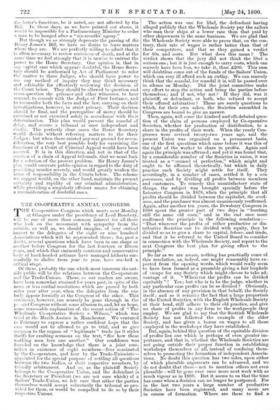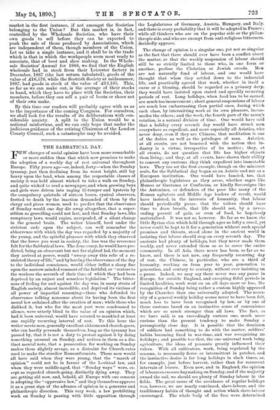THE CO-OPERATIVE ANNUAL CONGRESS. T HE Co-operative Congress which meets next
Monday at Glasgow under the presidency of Lord Rosebery, will be one of more than common interest for all those who look on the movement with sympathy from the outside, as well as, we should imagine, of very critical import to the delegates of the eight or nine hundred Associations which will be represented there; for, past a doubt, several questions which have been in one shape or another before Congress for the last fourteen or fifteen years, and which that eminently cautious and conservative body of hard-headed artisans have managed hitherto suc- cessfully to shelve from year to year, have reached a critical stage.
Of these, probably the one which most interests the out- side public will be the relations between the Co-operators and the Trade-Unions. These, as our readers are aware, have been somewhat strained for years past, in spite of the more or less cordial resolutions which are passed by both sides year after year, when the delegates from the one body appear formally at the Congress of the other. This ceremony, however, can scarcely be gone through in the pn. sent Congress without some allusion to, and, let us hope, some reasonable explanation of, the recent action of "The Wholesale Co-operative Society v. Wilson," which was tried at the March Assizes in Manchester. We ventured in February to express a rather confident hope that the case would not be allowed to go to trial, and so give occasion to the organs of "legitimate" trade (as it styles itself) for exulting sermons on the text, "See how these working men love one another." Our confidence was founded on the knowledge that there is a joint com- mittee in existence of eight members—four nominated by the Co-operators, and four by the Trade-Unionists- appointed for the special purpose of settling all questions between the two bodies, or their respective members, by friendly arbitrament. And so, as the plaintiff Society belongs to the Co-operative Union, and the defendant is the Secretary or President (we are not sure which) of a Sailors' Trade-Union, we felt sure that either the parties themselves would accept voluntarily the tribunal so pro- vided for them, or would be compelled to do so by their respective Unions. The action was one for libel, the defendant having alleged publicly that the Wholesale Society pay the sailors who man their ships at a lower rate than that paid by other shipowners in the same business. We are glad that the Wholesale Society were able to prove that, on the con- trary, their rate of wages is rather better than that of their competitors, and that so they gained a verdict for 40s. and costs. But what does this mean ? The verdict shows that the jury did not think the libel a serious one ; but it is just enough to carry costs, which can scarcely have been less, we take it, than £200. This sum will doubtless come out of the funds of the Sailors' Union, which can very ill afford such an outlay. We can scarcely think that the scandal, for scandal it is, will be passed over in silence on Monday. Did the joint committee make any effort to stop the action and bring the parties before themselves ; and if not, why not ? If they did, was it plaintiff, or defendant, or both, who refused to accept their offered arbitration ? These are surely questions to which, for their own sakes, the Societies assembled in Congress are bound to give an answer.
Then, again, will come the kindred and oft-debated ques- tion of the claim of persons employed by Co-operative Societies, whether for production or distribution, to a share in the profits of their work. When the yearly Con- gresses were revived twenty-two years ago, and the present Union was organised on a permanent basis, one of the first questions which came before it was this of the right of the worker to share in profits. Again and again the principle was affirmed ; and yet it was found that, by a considerable number of the Societies in union, it was treated as a "counsel of perfection," which might and ought to be affirmed theoretically, but which in daily practice each Society might settle for itself. They accordingly, in a number of eases, settled it by a non possumus, and by dividing all profits between members and customers. To remedy this unsatisfactory state of things, the subject was brought specially before the Leicester Congress in 188, when the principle that all profits should be divided between the capitalist, the work- man, and the purchaser was almost unanimously reaffirmed. Again, after another ten years, the Dewsbury Congress in 1888 spent the greater part of two days in "hunting still the same old coon," and in the end once more reaffirmed the principle in the following resolution :— " That wherever the profits of either productive or dis- tributive Societies can be divided with equity, they be divided so as to give a share to capital, labour, and trade, and that it be referred to the United Board to consider in connection with the Wholesale Society, and report to the next Congress the best plan for giving effect to the principle." So far as we are aware, nothing has practically come of this resolution, as, indeed, one might reasonably have ex- pected from the opening words, which would really seem to have been framed as a preamble giving a fair loophole of escape for any Society which might choose to take ad- vantage of it. "Wherever the profits can be divided equitably " ! Yes; but who is to be the judge, whether in any particular case profits can be so divided ? Obviously, in the absence of any provision in that behalf, the Society itself ; and so it remains the fact that a large proportion of the United Societies, with the English Wholesale Society at their head, still adhere to their old practice, and give no share of profits in any form to the workpeople they employ. We are glad to say that the Scottish Wholesale Society has not followed the example of the elder Society, and has given a bonus on wages to all those employed in the workshops they have established. But, again, behind this question of the equitable division of profits lies one which is perhaps of even greater im- portance, and that is, whether the Wholesale Societies are not going outside their proper function in establishing workshops themselves at all, instead of confining them- selves to promoting the formation of independent Associa- tions. No doubt this question has two sides, upon either of which plausible arguments can be advanced, and we do not doubt that these—not to mention others not even plausible—will be gone over once more next week with as much vigour as in 1888. But it seems to us that the time has come when a decision can no longer be postponed. For in the last two years a large number of productive Societies have been registered, and, many more are in course of formation. Where are these to find a market in the first instance, if not amongst the Societies belonging to the Union ? But this market is, in fact, controlled by the Wholesale Societies, who have their own goods to sell before they can be expected to push the sale of those produced by Associations, which are independent of them, though members of the Union. Let us take a single instance, and it shall be in the trade which is that in which the workpeople seem most ready to associate, that of boot and shoe making. In the Whole- sale Societies' Annual for 1888, we find that the English wholesale had in stock from their Leicester factory in December, 1887 (the last return tabulated), goods of the value of £16,578, while the Scottish Society at midsummer, 1887, had goods in stock of the value of £13,185. This, so far as we can make out, is the average of their stocks in hand, which they have to place with the Societies, their members, before they can sell a pair of boots or shoes not of their own make.
By this time our readers will probably agree with us as to the importance of the coming Congress. For ourselves, we shall look for the results of its deliberations with con- siderable anxiety. A split in the Union would be a national misfortune, and we can only hope that under the judicious guidance of the retiring Chairman of the London County Council, such a catastrophe may be avoided.



































 Previous page
Previous page